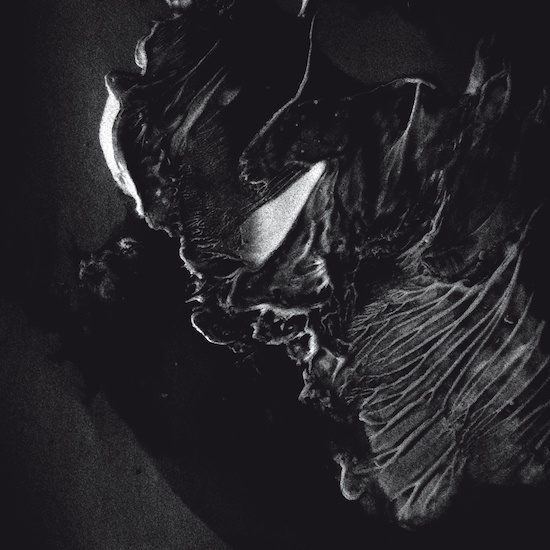
In preparing to write what you’re about to read I finally tried to answer a question I’ve wondered about for years: Where did the Portuguese band Wells Valley get their name?
After spending more time googling than I should have, and even reaching out to the band’s label Lavadome Productions, I still don’t know the answer. It may be a place on a map, a fixed location on the Earth, or a fictional location in a tale, conceived either by the band or some novelist or filmmaker.
I’m still curious, but one thing is quite clear: whatever else Wells Valley may mean, it now represents a landmark for a mysterious and extremely unsettling place the band create in a listener’s mind, and their new album Achamoth is a previously uncharted descent toward that harrowing place that’s unlike most others.

The lyrical conception of Achamoth doesn’t actually have anything to do with geography, real or fictional. Instead, it revolves exclusively around Sophia Achamoth, an ancient divinity often portrayed as the mother of the Demiurge and the Archons. As the label explains:
In various interpretations, she is believed to have descended from grace, inadvertently contributing to the creation of the material world as we know it—-a world sometimes likened to “The Matrix.”
The album delves into this enigmatic and obscure theme, exploring the multifaceted dimensions of Achamoth’s role and significance within different philosophical and spiritual contexts. Through its lyrics, the album invites listeners to contemplate the deep mysteries surrounding this ancient figure and her connection to the intricate fabric of existence.
This is the lyrical conception, yet the music itself still seems like a journey through previously unexplored and quite dangerous terrain — musical terrain usually left untouched by songs that fit exclusively within conventional genre terms. But not only an exploration of unusual and untamed wildness, the music also sounds like an accelerated geologic creation of the strange and frightening valley into which the music leads us.
That last point is intended as a way of conveying how immensely heavy the music is capable of becoming, like massive upheavals and fracturing in the mantle, a form of musical vulcanism. That’s a credit to the rhythm section, whose work is often titanically bludgeoning.
Equal credit is due them, however, for their inventiveness, for sudden changes in tempo and rhythmic (or arhythmic) patterns, for electrifying bursts of head-spinning drum fills and odd bass contortions (murmuring, magma-like, and mutilating), and for sudden silences.
The band also create fascinating interplays between bass, drums, and guitars, and the contrasts between the hard slugging in the low end and the uncomfortable ringing high above is a continuing source of chilling captivation.

Yet the riveting strangeness of the album’s journey, and the chilling places where it leads the listener, is indeed prominently a result of that brilliantly ringing and insidiously vibrating dissonance in the music’s upper reaches, which manifests in blaring and screeching chords, eerily squirming and painfully wailing arpeggios, tension-torquing pulsations, the swarming of mindless feeding things, brittle isolated notes, and a lot more.
The music crashes like strange waves, pierces the mind with mutated sirens, chimes like fractured bells, explodes in searing paroxysms, ruthlessly hammers, mewls and buzzes, and towers as if bearing witness to the sudden upward thrust of jagged peaks. As it does these things, the music’s moods change, channeling confusion and pain, hallucination and despair, fear and awe.
By now you get the idea that the music, while changing in unexpected ways, is damned dark, and the raw howling and screaming intensity of the vocals is a vital and relentlessly wrenching contributor to that engulfing darkness. But even the slow piano solo that ends the final song, the softest passage in the entire album, is desolating.
As observed at the outset, Achamoth isn’t hemmed in by steady genre boundaries. Another sign of that is how Lavadome lures listeners: They recommend it for fans of Blut Aus Nord, Emptiness, Ved Buens Ende, Nero di Marte, Neurosis, Esoteric, Voivod, and Isis.
And with that we’ll leave you to explore Achamoth in its entirety, and find for yourselves the places where it will lead you.
We’ll share a few further notes from the Lavadome label about how the album was made:
The album’s production highlights a meticulous dedication to achieving authentic, natural sound. Recorded, mixed and mastered by Mau (drums) in his SinWav Audio studio; there are minimal edits, no copy/pasting. The band eschewed presets, triggers, and digital effects, prioritizing the direct impact and power of human performance. Each sound originates from the musician, passes through a microphone, and enters the audio interface.
In addition, the album’s startling cover art was also created by a member of the band — the bassist André (bass).
Lavadome Productions will release Achamoth on September 29th, on CD and digital formats, with apparel.
PRE-ORDER:
https://lavadome.bandcamp.com/album/achamoth
https://store.lavadome.org/
WELLS VALLEY:
https://www.facebook.com/WellsValley/
https://wellsvalley.bandcamp.com/album/achamoth
